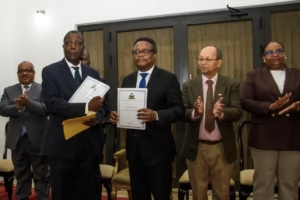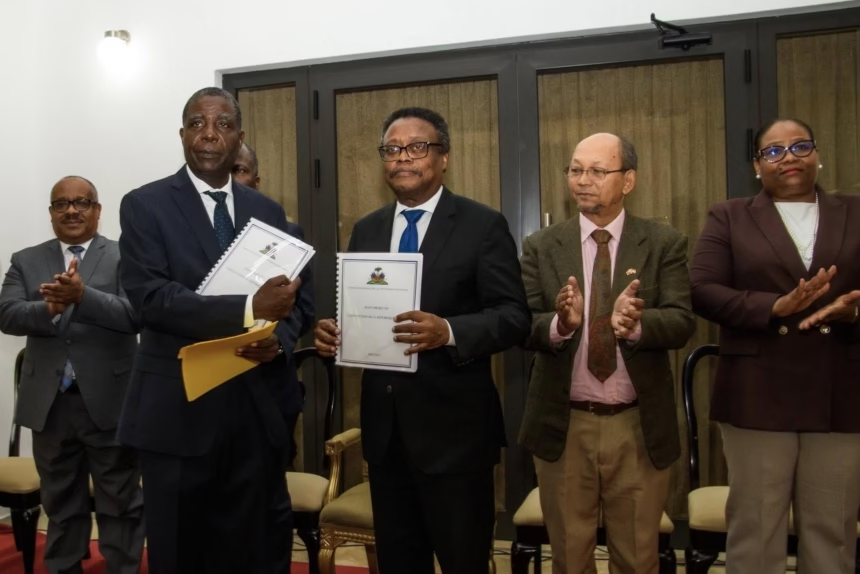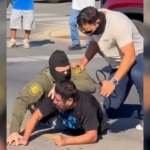Haiti’s Transitional Presidential Council (CPT) has officially abandoned its constitutional reform initiative, according to a communiqué issued Thursday night following an extraordinary Council of Ministers meeting held at the National Palace on the Champ de Mars. In the same statement, the Council reiterated its commitment to creating the conditions necessary for free, credible, and transparent elections—even as its mandate is expected to end in roughly four months, on February 7, 2026, under the April 3, 2024, agreement that established the transitional authority.
The meeting took place amid palpable tension, with reports of gunfire near the National Palace. This starkly contrasts with the CPT’s claims of “serenity” in its release. The session concluded with actions confirming the termination of the constitutional reform track.
According to the statement, members of the CPT and the government approved a draft decree repealing the July 17, 2024, decree that had created the National Conference, as well as the June 24, 2025, referendum decree. They also validated a draft order amending Articles 3 and 6 of the September 18, 2024, order governing the appointment and terms of members of the Provisional Electoral Council (CEP). In addition, the July 24 and September 2, 2024 orders concerning the composition of the National Conference Steering Committee were rescinded, thereby bringing that committee’s mandate to an end.
These moves formally dismantle the legal basis of the constitutional reform process. The CPT frames this as a shift to prioritize immediate stability and the need for credible elections, directly responding to public and political pressure.
These actions coincide with mounting international, especially U.S., pressure for the CPT to publish a credible electoral calendar. Senior U.S. diplomats have voiced impatience over delays and unclear timelines. External demands weighed on the CPT’s decision to drop the constitutional overhaul—which many see as divisive and too slow—so it can focus on organizing elections.
Diplomatic sources view CPT’s move as proper sequencing: first stabilize security, then establish a functional CEP with legal grounding, and finally enable credible elections. The CPT maintains that any election must meet basic security and administrative standards to be legitimate.
The retreat from reform also effectively acknowledges the de facto failure of a constitutional project that faced sustained criticism from the outset. Numerous political parties, civil society groups, and legal commentators argued that attempting to produce a new foundational text amid pervasive insecurity and political fragmentation was unrealistic at best. They denounced what they described as a rushed and insufficiently inclusive national consultation led by the Steering Committee, which they said lacked legitimacy and representative breadth.
The resulting draft constitution was received coolly. Observers highlighted legal ambiguities and provisions seen as misaligned with the country’s structural crises, including governance deficits, security breakdowns, and institutional weaknesses. Critics warned that pushing the text to a referendum under such conditions risked deepening polarization rather than resolving it.
Despite these changes, the CPT only reaffirmed its pledge to ensure free, credible, and transparent elections, but did not set a vote date. As a result, it remains unclear when the CEP framework will be finalized, when the electoral calendar will be published, what security benchmarks must be met, and how election logistics will be secured, all of which prolongs uncertainty as the February 2026 deadline nears.
The CPT’s choice to shutter the constitutional track signals an attempt to consolidate its limited bandwidth around the electoral file. Whether that recalibration can translate into concrete steps—legal, administrative, and security-related—within the remaining months will determine the feasibility of any transition through the ballot box.
For now, the Council’s pivot highlights the complexity of Haiti’s multifaceted challenges: deteriorating security conditions, contested institutional arrangements, and widespread public skepticism. The shelving of constitutional reform removes one source of contention but does not resolve the core constraints that have stalled political progress. Absent a clear electoral timetable and visible improvements in the security environment, uncertainty will persist.
Going forward, the CPT’s credibility and Haiti’s transition will depend on three clear actions: establishing a broadly accepted CEP, publishing a realistic electoral calendar, and making concrete security improvements to enable voting. Unless these steps are taken soon, political uncertainty and fragility will persist.








